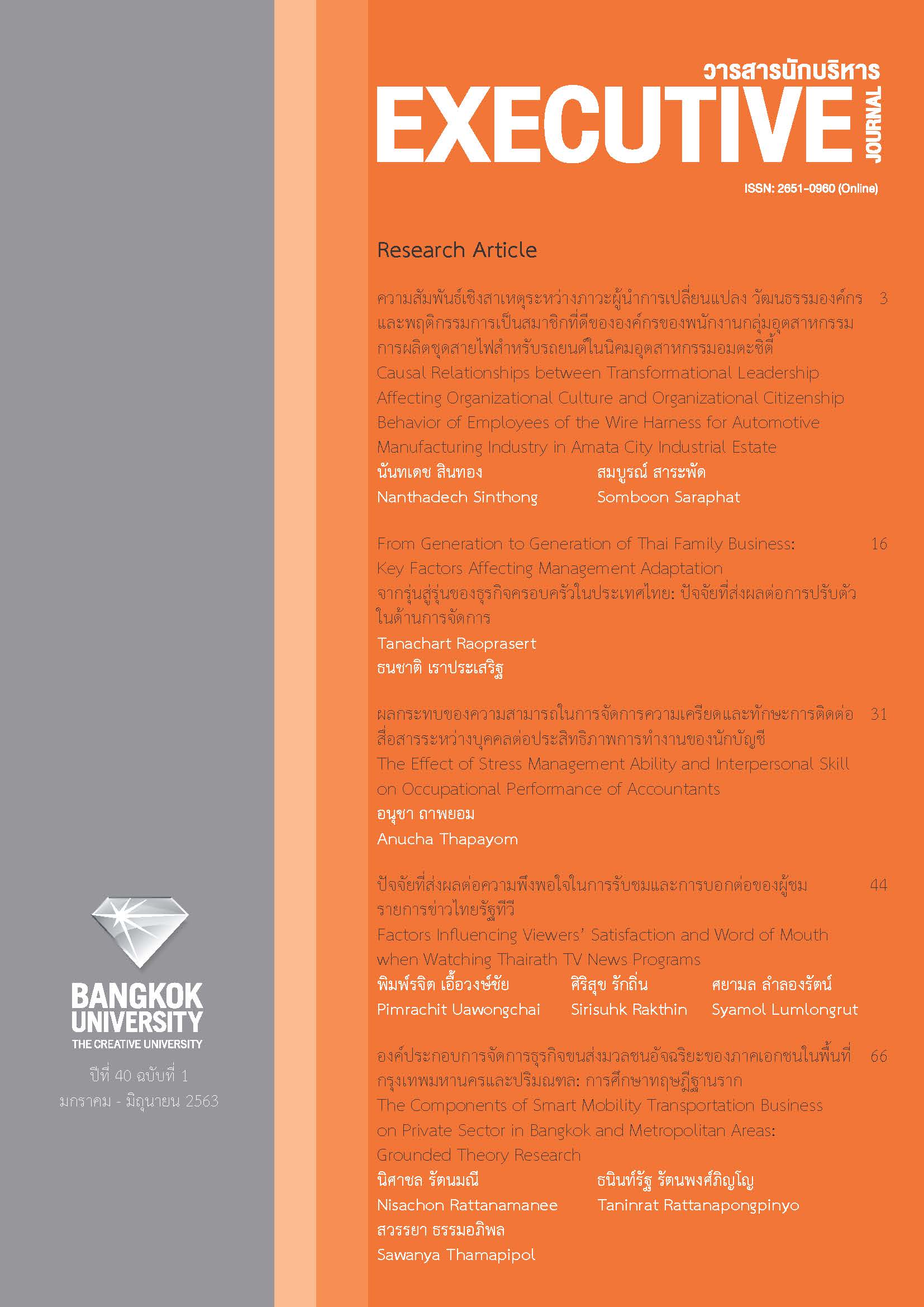Factors Influencing Viewers’ Satisfaction and Word of Mouth when Watching Thairath TV News Programs
Main Article Content
Abstract
This research aimed to investigate the factors affecting Thairath TV news viewers’ satisfaction and word of mouth. Data were collected via questionnaires from 400 participants. Mean, percentage, independent samples t-test, One-Way ANOVA and multiple regression analysis were used to analyze the data. The results showed that Thairath TV news viewers had the average satisfaction level of 3.59 on Thairath TV news programs and the average word of mouth level of 2.71 when watching Thairath TV news programs. The viewers who had different demographic characteristics, i.e., age, educational levels, and residential locations had different levels of satisfaction and word of mouth when watching news on Thairath TV, while those with different levels of income had only different levels of satisfaction when watching news on Thairath TV. Moreover, the factor that mostly affected the viewers’ satisfaction was broadcasting schedule, whereas the factor that mostly influenced the viewers’ word of mouth was a social trend. When considering the effects of a moderator, i.e., special situation policy occasionally implemented by Thairath TV, we found that the special situation policy moderated the strength of relationships between independent and dependent variables at a statistical significance level of 0.05.
Article Details
The manuscript submitted for publication must be the original version, submitted only to this particular journal with no prior acceptance for publication elsewhere in other academic journals. The manuscript must also not violate the copyright issue by means of plagiarism.
References
Apiromvijit, M. (2011). Patčhai thī mī ʻitthiphon nai kānpœ̄trap chom rāikān khāo banthœ̄ng khō̜ng prachāchon thūapai nai khēt Krung Thēp Mahā Nakhō̜n [Factors influencing the exposure of audiences with entertainment news in Bangkok] (Independent study, Thammasat University).
Chen, G. M. (2011). Tweet this: A uses and gratifications perspective on how active Twitter use gratifies a need to connect with others. Computers in Human Behavior, 27(2), 755-762.
Choi, E. K., Fowler, D., Goh, B., & Yuan, J. (2016). Social media marketing: Applying the uses and gratifications theory in the hotel industry. Journal of Hospitality Marketing & Management, 25(7), 771-796.
Dimmick, J., & Albarran, A. (1994). The role of gratification opportunities in determining media preference. Mass Communication Review, 21, 223–235.
Dunne, A., Lawlor, M., & Rowley, J. (2010). Young people’s use of online social networking sites a uses and gratifications perspective. Journal of Research in Interactive Marketing, 4(1), 46-58.
Habes, M. (2019). The influence of personal motivation on using social TV: A Uses and Gratifications Approach. International Journal of Information Technology and Language Studies, 3(1), 32-39.
Hilvert-Bruce, Z., Neill, J. T., Sjöblom, M., & Hamari, J. (2018). Social motivations of live-streaming viewer engagement on Twitch. Computers in Human Behavior, 84, 58-67.
Institute of Research and Development for Public Enterprises. (2015). Rāingān chabap sombūn khrōngkān sưksā nǣothāng nai kānčhatkep khō̜mūn phrưttikam kānchai bō̜rikān kitčhakān kračhāisīang læ kitčhakān thōrathat [Audience measurement]. Retrieved July 26, 2019, from https://broadcast.nbtc.go.th/data/academic/file/581000000001.pdf
Katz, E., Blumler, J. G., & Gurevitch, M. (1974). Utilization of mass communication by the individual. In J. G. Blumler, & E. Katz (Eds.), The uses of mass communications: Current perspectives on gratifications research (pp. 19-31). Beverly Hills, CA: Sage.
Kemp, S. (2017). Digital in 2017: Global overview, a collection of Internet, social media, and mobile data from around the world. Retrieved July 26, 2019, from https://wearesocial.com/special-reports/digital-in-2017-global-overview
Lin, Y. H., Hsu, C. L., Chen, M. F., & Fang, C. H. (2017). New gratifications for social word-of-mouth spread via mobile SNSs: Uses and gratifications approach with a perspective of media technology. Telematics and Informatics, 34(4), 382-397.
McQuail, D., Blumler, J. G., & Brown, J. R. (1972). The television audience: A revised perspective. In D. Mcquail (Ed.). Sociology of mass communications: Selected readings (pp. 135-165). Harmondsworth: Penguin.
Nunnally, J. C., & Bernstein, I. H. (1994). Psychometric theory (3rd ed.). New York, NY: McGraw-Hill.
Palasak, P. (2015). Patčhai khwāmsamret khō̜ng ʻongkō̜n thī song phon hai sathānī Thai rat thī wī penthī raprū læ čhotčham khō̜ng phū chom nai khēt Krung Thēp Mahā Nakhō̜n [Organization success factors affecting audience perception and recognition: Case study of Thairath TV station] (Independent study, Bangkok University).
Rubin, A. M. (1981). An examination of television viewing motivations. Communication Research, 8(2), 141-165.
Rubin, A. M. (1983). Television uses and gratifications: The interactions of viewing patterns and motivations. Journal of Broadcasting & Electronic Media, 27(1), 37-51.
Steiner, E., & Xu, K. (2020). Binge-watching motivates change: Uses and gratifications of streaming video viewers challenge traditional TV research. Convergence, 26(1), 82-101.
Tan, A. S. (1985). Mass communications theories and research. New York, NY: Macmillan.
Thairath Online. (n.d.). Prawat khwāmpenmā yuk thī nưng - hok [History era 1-6]. Retrieved December 8, 2018, from https://www.thairath.co.th/corporate/generation1
Thī wī dičhitō̜n pī sō̜ngphanhārō̜ihāsippǣt khrai rō̜t khrai rūang [Digital TV in 2015, who survived]. (2016). Daradaily. Retrieved December 8, 2018, from https://mobile.daradaily.com/news/51821
Vanichbuncha, K. (2006). Sathiti samrap ngānwičhai (Phim khrang thī 2) [Statistics for research (2nd ed.)]. Bangkok: Chulalongkorn University Press.
WP. (2017). Chat tem! ʻutsāhakam sư̄ pī hoksip pī thō̜ng thī wī dičhithan ʻō̜nlai phrō̜m čho̜ lưk hā sēn rǣng hǣng pī [Full! Media industry, 60 years of digital-Online TV with insights into 5 trendsr]. Brand buffet. Retrieved December 8, 2018, from https://www.brandbuffet.in.th/2017/01/media-outlook-and-trends-2017/


